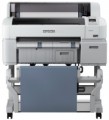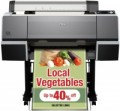Max resolution
The highest image resolution the plotter is capable of printing on paper. It is indicated by the number of dots per inch horizontally and vertically — for example, 1440x720.
The higher the resolution, the smoother the printed image will be as a result, the less noticeable individual dots will be on it (to the point that they cannot be seen at all with the naked eye). On the other hand, the ability to print in such resolutions affects the price of the plotter accordingly. In addition, do not forget that high-quality printing requires appropriate source materials — the quality of the print cannot be higher than the quality of the original image.
Note that in this case we are talking about the maximum resolution; usually in the settings it is possible to set more modest parameters.
Print speed
The print speed provided by the plotter.
Such devices are intended for large-format material, so this parameter is usually indicated as m² per hour. Keep in mind that the spec usually give the maximum print speed, which is achieved at a reduced resolution and overall quality; in standard mode, the plotter may work noticeably slower. So when choosing for this parameter, it is worth taking a certain margin. On the other hand, according to the values indicated in the specs, it is quite possible to evaluate different models and compare them with each other: the difference in the claimed performance, usually, will proportionally correspond to the difference in the actual speed of work.
As for specific values, speed
up to 20 m²/h for modern plotters is considered low,
21 – 50 m²/h — medium, and in the most powerful and performant equipment this value can
exceed 50 m²/h.
Sheet printing time
Approximate time taken by the plotter to print one sheet.
This indicates for the paper size that the machine was originally designed for (see "Paper Size"). And it is approximate because it is usually given for optimal or almost optimal printing conditions: low quality and resolution, relatively simple images, etc. So the actual print time of the sheet may differ from the claimed one in one direction or another, depending on the operating parameters — starting from the mentioned quality and resolution to the type of media. However, according to the figures indicated in the specs, it is quite possible to evaluate different models and compare them with each other: the difference in the claimed time, usually, will proportionally correspond to the difference in the actual printing speed.
It is also worth noting that this time is usually indicated by the duration of the printing process itself — from the capture of the sheet by the feeder to the output of the completed print from the device. Interruptions inevitably occur between printing individual sheets, so that the total printing time is longer than the printing time of a sheet multiplied by the number of sheets. For example, a device with a time consumption of 36 sec per sheet theoretically should print about 100 sheets per hour (1 h = 3600 s, 3600/36 = 100), but in fact such a plotter usually produces about 70 – 75 sheets in this time.
Cartridge model
Models of cartridges used in the plotter. With this info, you can easily find original consumables for the device.
Built-in memory
The amount of built-in memory provided in the design of the plotter.
Such memory is used to store various service data: print tasks, settings profiles, etc. Due to this, the plotter becomes more "independent": for example, many models allow you to continue printing even when the master PC is turned off.
We emphasize that in this case we are talking about solid-state flash memory, which is used mainly for "operational" service information. The capacity of such memory is relatively low, it is measured in megabytes; but in addition to it, the design may include a larger storage capacity — usually a traditional hard drive. For more information about it, see "Drive Capacity".
Power consumption
Rated power consumption of the plotter. Usually specified by the maximum value — for the print mode, when the device requires the most power.
The heavier and more performant the device, the higher its power consumption in general. At the same time, models that are similar in performance may differ in this indicator. And here it is worth proceeding from the fact that a more energy-efficient unit usually costs more, but with intensive use, this difference can quickly pay off due to energy savings.
In addition, the power consumption may be necessary for special electrical calculations — for example, determining the necessary parameters of a voltage stabilizer, a backup generator, etc.
Main unit dimensions (WxDxH)
Dimensions of the main unit of the device. For desktop models (see "Placement") this is the total size of the entire plotter, it is a spec you need to focus on while choosing a model and evaluating a place for installation. For floor-standing devices, the dimensions are indicated here without taking into account the stand, so this parameter plays a minor role and can be useful mainly for storing or transporting the device in disassembled form.
Dimensions with stand (WxDxH)
The overall dimensions of the floor plotter (see “Placement”), including the stand, in other words, the dimensions of the device in the operative condition (in addition to the stand itself, other equipment, such as trays for printed materials, is taken into account here). This indicator is worth evaluating how much space is needed to install such a plotter.
Weight
The total weight of the plotter is usually listed without ink and paper. You should pay attention to this parameter foremost when choosing desktop models (see "Placement"): modern plotters are quite massive, which puts forward corresponding requirements for stands for them.

